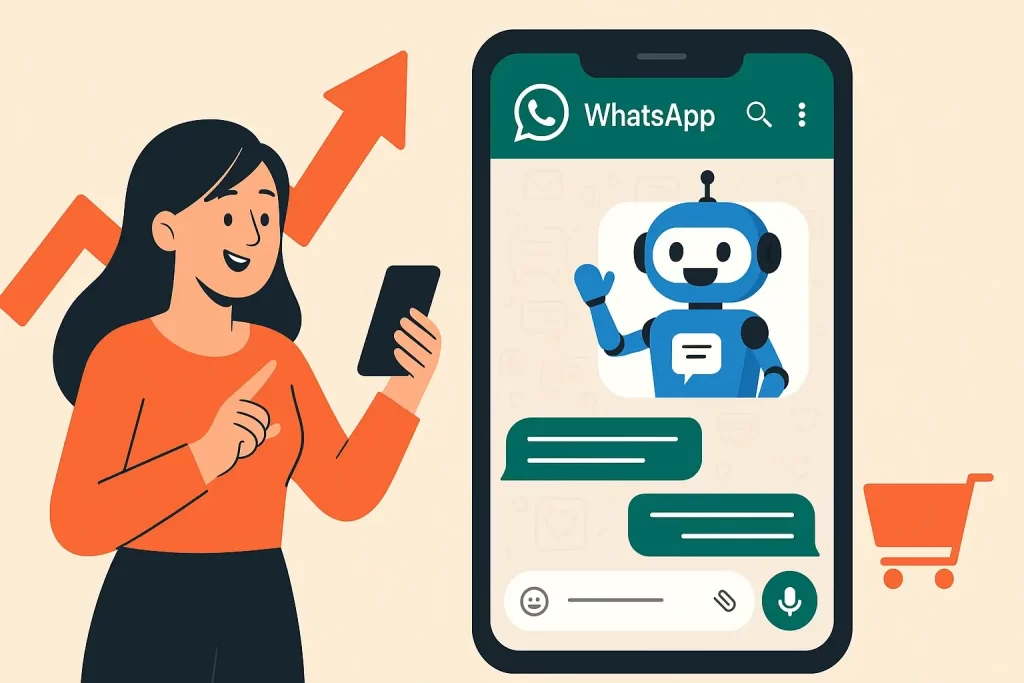WhatsApp Chatbots: Transforming Customer Support and Driving Sales
In today’s fast-paced world, quick communication is key.
Customers want answers now, not later.
That’s why businesses are turning to WhatsApp chatbots.
These nifty tools are changing the game, making it easier than ever to talk with customers, boost sales, and keep everything running smoothly.
So, how can WhatsApp chatbots help your business? Let’s dive in.

Why WhatsApp Chatbots Matter
WhatsApp is huge. Over 2.78 billion people use it worldwide. Available in over 180 countries.
That’s a lot of potential customers!
WhatsApp handles over 100 billion messages sent every day, illustrating the massive volume of communication that occurs on the platform.
And with a 98% open rate, messages sent via WhatsApp are almost guaranteed to be seen.
Compare that to emails, which only get opened about 17-24% of the time.
The difference is clear: WhatsApp is a powerful way to connect with people.
24/7 Customer Support: Always There for Your Customers
Imagine a customer has a question at 2 AM. Do they want to wait until morning? No way. They want answers now. This is where WhatsApp chatbots shine. They can handle questions and provide support anytime, day or night.
Around 80% of small businesses using WhatsApp reported that it helps them communicate with customers and grow their business.
Example: Look at Amazon. They use chatbots to answer common questions, like “Where’s my order?” or “How do I return this item?” This frees up their human support team to handle more complex issues, making the whole system more efficient.
For your business, this means happy customers who feel cared for, even when you’re not around.
Personalization at Scale: Making Every Customer Feel Special
People love feeling special. They want to know that businesses care about them as individuals.
With WhatsApp chatbots, you can offer personalized experiences to each customer.
These bots can remember past conversations, suggest products based on previous purchases, and even greet customers by name.
A survey by Salesforce found that 67% of consumers worldwide prefer messaging apps like WhatsApp for customer support over traditional channels like email or phone.
Example: Spotify does this really well. Their chatbot can recommend songs and playlists based on what users have listened to before. It’s like having a personal DJ who knows exactly what you like.
By using personalization, you make customers feel valued, and they’re more likely to come back for more.
Cost Efficiency: Save Money, Boost Service
Running a business is expensive. Every dollar counts.
Traditional customer service, like phone calls and emails, can eat up time and money.
WhatsApp chatbots offer a cheaper solution. They handle many tasks that would normally require a person, like answering FAQs or guiding customers through a purchase.
Businesses that implement chatbots for customer service report up to a 40% reduction in customer support costs, thanks to the automation of routine queries.
Example: H&M uses WhatsApp chatbots to help customers find clothes in their size and style. This not only saves time but also reduces the need for a large customer service team.
For your business, this means lower costs and more money to invest in other areas, like product development or marketing.
Boosting Customer Engagement: Keep the Conversation Going
Engaging with customers isn’t just about selling something. It’s about building relationships.
WhatsApp chatbots can send reminders, share updates, and even offer special deals, keeping customers in the loop and interested in what you have to offer.
WhatsApp chatbots can reduce response times to under a second, providing customers with instant answers to their queries and improving overall satisfaction.
Example: Sephora uses a WhatsApp chatbot to send beauty tips, product recommendations, and exclusive offers to its customers. This keeps Sephora top-of-mind and encourages repeat purchases.
By keeping the conversation going, you stay connected with your customers, making them feel valued and encouraging them to return.
Real-World Applications of WhatsApp Chatbots
Businesses across various industries are utilizing WhatsApp chatbots to enhance their operations.
Here are a few examples:
E-Commerce Excellence: Making Shopping Easy and Fun
Online shopping should be easy. But sometimes, customers need help. Maybe they can’t find a product, or they’re unsure about sizing.
WhatsApp chatbots can assist, making the shopping experience smoother and more enjoyable.
Example: Nike’s chatbot helps customers find the perfect shoes. It asks about their needs, like running or walking, and suggests options. It’s like having a personal shopper in your pocket.
For your business, this could mean more sales and happier customers.
Streamlined Customer Service: Fast Help Across Industries
Industries like finance and healthcare also benefit from WhatsApp chatbots.
These bots can answer routine questions, book appointments, and provide important updates. This speeds up service and lets human staff focus on more complex tasks.
A survey conducted by Ubisend found that 94% of users who interacted with a chatbot on WhatsApp had a positive experience, appreciating the instant responses and 24/7 availability.
Example: Bank of America’s chatbot, Erica, helps customers manage their accounts, check balances, and even find nearby ATMs. It’s quick, easy, and always available.
For your business, a chatbot could handle routine inquiries, letting your team focus on bigger challenges.
Targeted Marketing and Sales: Personalized Campaigns That Work
Marketing is all about the right message at the right time.
WhatsApp chatbots can send personalized offers based on what customers like, increasing the chances they’ll buy.
3x More Conversions: Businesses that use WhatsApp chatbots for lead nurturing see up to three times more conversions compared to traditional methods.
Example: Coca-Cola used a WhatsApp chatbot for a promotion where customers could win prizes by scanning a code on the bottle. The chatbot handled entries, sent updates, and announced winners, all automatically.
For your business, targeted campaigns like this can boost sales and engagement, making your marketing efforts more effective.
Real Results in Numbers:
JioMart:
- Reduced response time by approximately 60% via WhatsApp chatbot.
- The WhatsApp chatbot enables JioMart to complete 1500+ average daily sales
- 70% of customers who use the WhatsApp bot make repeat purchases
- Chatbot has a 15% retention rate
- Bot successfully handled ~90% of engaged queries
- Automated 45% of all customer queries
Eureka Forbes:
- Chatbot handled over 1.5 million conversations
- Engaged 1 million people on WhatsApp
- Automation saved 200,000+ hours for employees by taking over common queries
Oyo Hotels:
- Decreased call volume by 15%.
- On average, Oyo‘s chatbot handles 85,000 conversations and 55,000 unique users per month
India’s COVID-19 Chatbot:
- Chatbot answered nearly 110 million queries about COVID-19, symptoms, and more
- Helped disseminate timely, verified information to curb the spread of misinformation
Upstox:
- Automated approximately 80% of customer queries via WhatsApp.
- Chatbot onboarded 220,000+ customers in under 6 months
- Increased the number of transactions by 20%
- Handled 3.7 million conversations
Plum:
- Resolved 80% of claims via WhatsApp bot.
- Cut average claim submission time by 60%
Plantix:
- Enabled farmers to detect crop diseases via WhatsApp.
The Future of WhatsApp Chatbots: What’s Coming Next?
Technology keeps changing, and WhatsApp chatbots are only going to get better.
We’re likely to see even smarter bots that can understand and respond just like a human.
Imagine a bot that can handle a complex customer complaint or negotiate a deal. The possibilities are endless.
As more businesses catch on, those who embrace WhatsApp chatbots now will be ahead of the curve.
The sooner you start, the more time you’ll have to refine your chatbot strategy and perfect the customer experience.
Conclusion: Time to Get on Board
WhatsApp chatbots aren’t just a trend; they’re the future of customer service and sales.
They offer 24/7 support, personalized experiences, and cost savings, all while keeping customers engaged and happy.
If you want your business to stay competitive and grow, now’s the time to start using WhatsApp chatbots.
They’re easy to set up, work around the clock, and can make a huge difference in how you connect with customers.
So why wait? Start integrating WhatsApp chatbots into your business strategy today.
The results will speak for themselves: happy customers, increased sales, and a more efficient operation.
Recommended Reading:
















